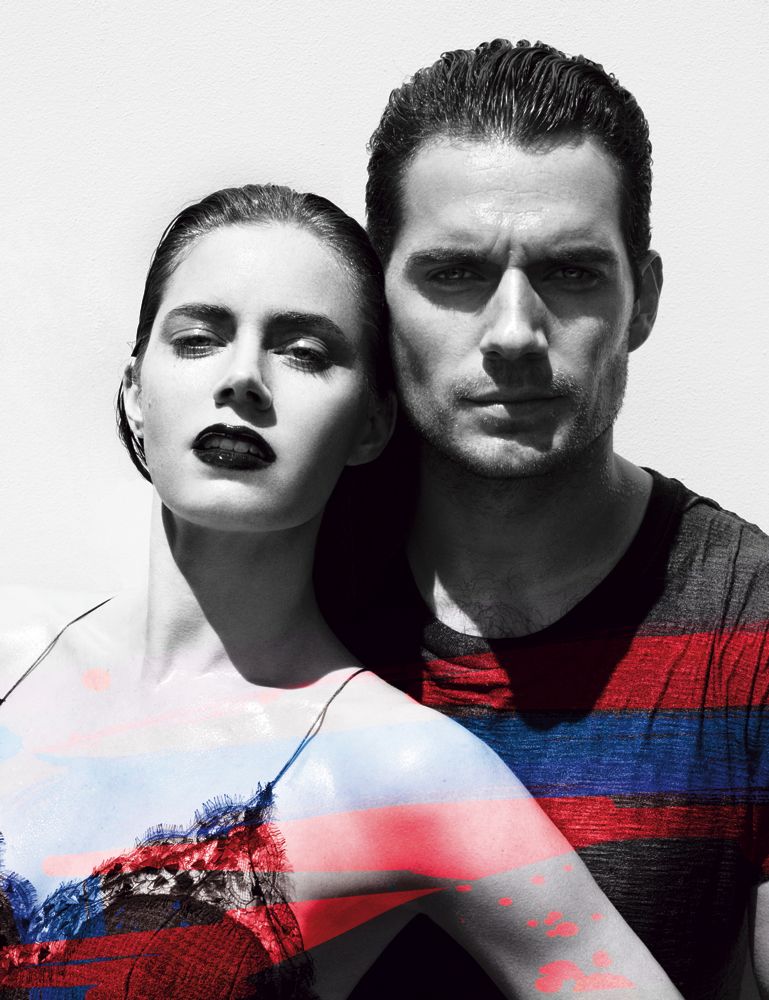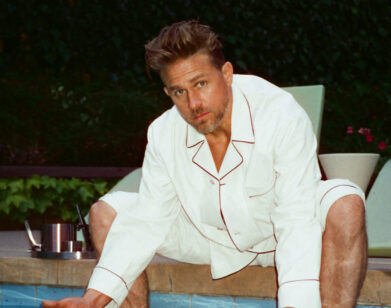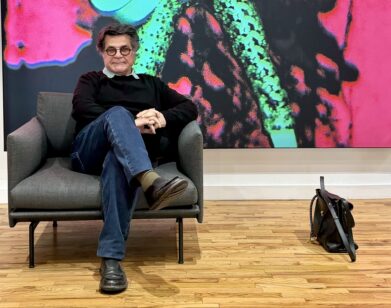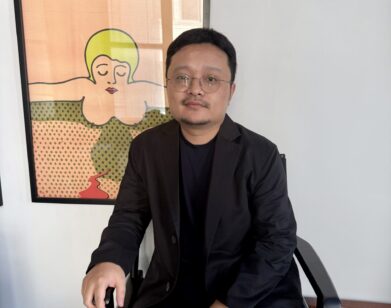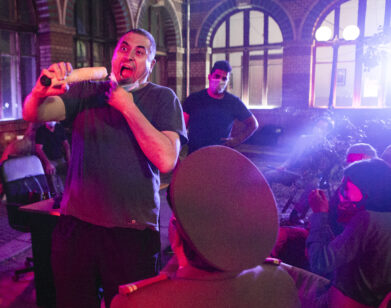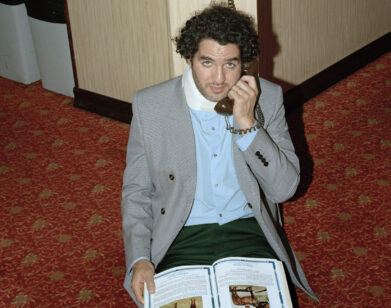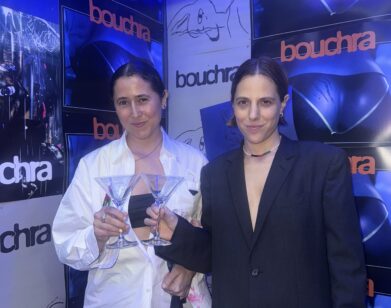Amy Adams
I’VE always REALLY LOVED ACTION FILMS, but I DON’T SEE MYSELF AS A SUPERHERO GIRL, SO MY LOIS IS a MERE MORTAL—FULL of IMPERFECTIONS. Amy ADAMS
ELVIS MITCHELL: So I understand that you’ve been busy lately.
AMY ADAMS: Pretty busy. It’s good, though. I was in Boston shooting a film, and we’re just packing up for a flight now. But it’s fun because my daughter is really excited, so there’s a positive energy.
MITCHELL: Is she a good traveler?
ADAMS: She is. You know, she’s 3, so it presents its challenges, but she does a pretty good job—although I’m sure the other people in the cabin might say something else. [laughs]
MITCHELL: Were you a good traveler as a kid?
ADAMS: Yeah, we had to be. I was one of seven, and we took a lot of road trips—long road trips. And this was before iPhones and iPads and DVD players in cars. I remember how novel it was when I got my own Walkman so I could listen to music.
MITCHELL: What would you listen to?
ADAMS: It’s going to sound silly, but one of my favorites was the Out of Africa [1985] soundtrack.
MITCHELL: Why would that sound silly? John Barry is one of my favorite composers.
ADAMS: I loved it. I loved watching the scenery go by to that music.
MITCHELL: So you were already making movies in your head …
ADAMS: At the time, I was probably more into ballet. I thought Out of Africa would be a beautiful ballet.
MITCHELL: What else would you listen to?
ADAMS: It doesn’t sound as artistic, but the Dirty Dancing [1987] soundtrack. Man of La Mancha. Lots of musicals—Phantom of the Opera, Les Miz.
MITCHELL: Did you ever get to see any of those or perform in any of them in school?
ADAMS: No. I mean, I saw some musicals at dinner theaters where I grew up. But I didn’t go to a big theater to see one until probably after I graduated from high school when I took myself to see Tommy when it was on tour. I absolutely loved it.
MITCHELL: You saw the film version, right? That’s one of the craziest movies ever made.
ADAMS: Really crazy. It’s pretty good—I was a huge Ann-Margret fan, and I wanted to be like her.
MITCHELL: How old were you when you saw Bye Bye Birdie [1963]?
ADAMS: I was really young when I saw that. My dad was into musicals. I was really into Grease [1978], too, when I was a kid—like reenacting “Hopelessly Devoted to You…” [laughs] I was a strange child. But I think I’m probably painting a pretty accurate picture.
MITCHELL: So what was your feeling when the possibility of playing Lois Lane first came to you?
ADAMS: I was excited. I had talked about it before. I had screen-tested at various points over the years with Matt Bomer and Paul Walker when it was attached to different directors and there were different teams involved. Then, I read again when Bryan Singer [who directed 2006’s Superman Returns] was brought on. So it was interesting that it would reappear… I’ve always really loved action films, but I don’t see myself as a superhero girl, so my Lois is a mere mortal—full of imperfections. She’s someone I identify with. So this was an opportunity to be in a genre film without having to train—which was a positive thing.
MITCHELL: So you didn’t want to go on the chicken-and-broccoli diet so you can go out and defeat a bunch of supervillains?
ADAMS: No. I mean, I always want to defeat supervillains—it’s just the chicken-and-broccoli diet that I’m not into. [both laugh] I have a small child, so the idea of getting up at 3 a.m. to train before a day of shooting … I just don’t have it in me, although I have so much respect for people who do. I’ll allow myself to be flawed. The illusion of perfection is an illusion anyway.
MITCHELL: What were your feelings about playing Lois Lane, though? Obviously, you grew up seeing Margot Kidder playing Lois, which was almost a screwball-comedy take on it.
ADAMS: Well, Zack [Snyder, who directed Man of Steel] always said that he wanted it to feel a little more real. He just wanted Lois to be tough as nails and to have a lot of heart. In the beginning—before I’d read the script—it was more about getting an understanding of the kind of world that he was going to put her in. That was important to me. But it was always the realness that he was after. Even with the decision of whether or not to dye my hair, he said, “Is this your natural color?” And I hadn’t dyed it in a year at that point, and he said he wanted it to be natural because Lois is a reporter and she’s going all over the place and probably wouldn’t spend much time dying her hair. So I think that he was interested in making his own stamp and not forcing some idea of who Lois was on the character and just letting her exist in this world of the film.
THIS WAS an OPPORTUNITY TO BE IN A GENRE FILM WITHOUT HAVING TO TRAIN…I always WANT to DEFEAT SUPERVILLAINS —IT’S JUST THE CHICKEN-and-BROCCOLI DIET THAT I’M NOT INTO. Amy Adams
MITCHELL: It’s funny because the film as a whole exists at this intersection of being kind of hyper-real and old-fashioned sweet, in a way.
ADAMS: But isn’t that the wonderful thing about movies? Of course, you want it to be as real as possible because you’re about to have aliens in huge metal-alloy suits who come down and create gravity fields. To play real around that is fun—to treat it like it’s happening. What I like about Lois and Clark, too—and what I think we’ve preserved—is that there is this sort of throwback, gal Friday feel to her, that she exists in a man’s world and she’s still extremely feminine. It was important to me because I do believe that you don’t have to act like a man to be strong. You can still be feminine. But making the film was amazing, and that’s how I usually judge the experience. I mean, it was hard work, but I didn’t get the brunt of that—Henry was the one who had to get up at 3 a.m. to train and then work long hours, sometimes in extreme conditions. Zack has a real vision for what he wants and he’s very specific, which I also found great. Working with green screen, you really rely on the director in a way that you don’t on different types of films. But he gets up and runs and points and does sound effects and shows you what’s happening. So just even as a human being, it was fun.
MITCHELL: Had you ever been offered an action film before?
ADAMS: I don’t know if I have. But if I was ever going to do one, it would be playing a character like Lois. I don’t see myself identifying with or being right for another character. Maybe I’m selling myself short.
MITCHELL: To some extent, Night at the Museum: Battle of the Smithsonian [2009] is kind of an action film.
ADAMS: Well, obviously, we played it completely removed from reality, which was a lot of fun because I got to create this character of Amelia Earhart as, like, a real fast-talking broad. So the conceit of imagination was a lot of fun.
MITCHELL: It was sort of like if you took Katharine Hepburn out of The Philadelphia Story [1940] and put her into an action movie.
ADAMS: Oh, yeah. I love all those old films. I think Miss Pettigrew [Lives for a Day, 2008] is where I paid homage to those wonderful ladies of our golden era of film, like Vivien Leigh and Marilyn Monroe and Audrey Hepburn.
MITCHELL: Did you see a lot of action movies as a kid?
ADAMS: Yes. Superman [1978] and Superman II [1980] were a couple of my favorites. I loved Clash of the Titans [1981]—I had such a crush on Perseus. What else? Dragonslayer [1981] … I think I was too young to be seeing Dragonslayer, but my dad loved movies, so we were exposed to a lot of films.
MITCHELL: That’s a different palette of films than a lot of people probably think you watched as a kid.
ADAMS: Yeah. It’s probably more commercial than people assume. I always have directors who are somewhat frustrated because they’ll reference a beautifully obscure film from the ’50s or ’60s or ’70s, and I’ve not seen it. But I can tell you every line in E.T. [1982] or Time Bandits [1981]. I saw An American Werewolf in London [1981]—I saw really weird movies as a kid, which was funny because we were raised Mormon. We got a VCR when they first came out, and my dad found a way to remove the nudity from the movies, but he had no trouble leaving in the decapitation. Now that I think about it, it was like, “We’re not allowed to watch people make out in the shower, but there’s no problem watching a guy with no face beat fried eggs in a hospital room?” Anyway, you get the idea.
MITCHELL: I do. [laughs]
ADAMS: But I loved Star Wars [1977] … I think I’ve always been into those sorts of films. It’s just that when I started acting, my sensibility landed a little more toward an indie type of film. So I was really excited when Man of Steel came along.
MITCHELL: What was it like when you got to meet Steven Spielberg for Catch Me If You Can [2002]?
ADAMS: That was amazing. I mean, he was the guy who made Jaws [1975] and E.T. and Raiders of the Lost Ark [1981]. Those were the movies that I grew up on. I remember at that point, I’d been auditioning for a while, and sometimes it’s not really about how well you do, so I didn’t really think about it after I did it. I knew I had a good audition, though. But when I got the call that Steven wanted to meet me, I was just floored. So I made a deal with myself that I would go in and meet with him and just be as honest as possible and I wouldn’t have any regrets—that I’d just be myself. And I was definitely myself. [laughs] I was a little embarrassed when I walked out of the room because I probably should have been more … I don’t know. Maybe that helped me get the job because I was very much channeling the character. But that’s always been my philosophy: I try to just be as straightforward as possible, and then I don’t really have to question what I said or regret anything … Although I’ve probably regretted things I’ve said because I was so straightforward.
MITCHELL: It’s interesting to hear you say that because so many of the characters that you’ve played are straightforward or direct in their own ways …
ADAMS: Thank you for saying that. I don’t know … The character I just finished playing is a pretty manipulative person, but I’ll see how that comes across.
MITCHELL: This is in the David O. Russell film that you’ve been shooting?
ADAMS: Yeah. I wouldn’t call myself a manipulative person … “Amy is not manipulative”—speaking in the third person, which is the most embarrassing thing to do in an interview.
MITCHELL: [laughs] Do you do that often?
ADAMS: No. It’s actually just that a friend of mine and I used to pretend that it was fun to do that at a party. “Amy is having a very good day … “
MITCHELL: Well, I’m glad that Amy is making time to talk to me today. [Adams laughs] So you were shooting with David up in Boston. Did you guys end up losing time because of the bombing at the marathon?
ADAMS: We sort of fell away when it happened, so we were able to keep the production rolling on the day, but then we did lose some time when they put everyone on lockdown. It was surreal. But I’m not somebody to sort of personalize a tragedy like that, unless it’s something that happened to me personally, so I felt like the important thing at that point was to reach out to the community. The people in Boston—their sense of community is so important to them. So instead of making it about my personal drama, I saw it more as a personal mission to reach out and try to help the people who were affected by it however we could.
MITCHELL: Did you have a chance to do that?
ADAMS: I did. I got a chance to talk to a couple of people who were still in the hospital—a couple of the actors did. It’s a long road for them, and I wish them the best, and send them so much support.
MITCHELL: This is the second film that you’ve done with David in the area …
ADAMS: Yeah, and it seemed like everybody we knew was once removed from somebody who was affected. We knew people who worked with people who were victims, so it felt very close. My family was safe, so I was grateful for that.
MITCHELL: I’ve known David for a while and you’ve worked with him a couple of times now, so I wonder if this is something you noticed, but in Silver Linings Playbook, Bradley Cooper is doing David a little bit in that performance …
ADAMS: [laughs] I’m not going to say a word.
MITCHELL: Well, I think you’ve given the game away already by your silence. “Amy is being very quiet … “
ADAMS: “Amy is not walking into that trap … ” It’s funny that you would pick up on that.
MITCHELL: You first got to work with David, though, at an interesting time, because The Fighter [2010] was a different kind of film for him. I remember talking to him about that movie and about you, and he said, “She’s tough, but nobody has given her the chance to be tough in a movie before.”
ADAMS: He did give me a chance to be tough—I’m glad that he saw that in me. I can be very polite, and I think that people can confuse that for all sorts of things … But I’ll take that over people assuming that I’m smart just because I’m short and rude.
MITCHELL: That’s an interesting hat trick that I’ve never heard before.
ADAMS: I don’t know … As David and Bradley would say, I’m just “spit-balling” right now.
MITCHELL: [laughs] But there is a kind of plainspoken determination to many of the characters you’ve played.
ADAMS: I would say that a lot of the characters I’ve been attracted to are very vulnerable and they expose themselves emotionally. Not so much in The Fighter, not so much in The Master—I think those are different. But definitely in Doubt [2008] and Enchanted [2007]. Those characters put their hearts out there, which is always a scary thing to do. I find that in life all you can do is try to be honest about who you are and how you’re feeling, and trust that it will be received in the correct way. I haven’t spent a lot of time evaluating my body of work for a through line, but I guess I am curious about the way people have connected with certain things, and I do find it interesting that I tend to be attracted to—or the world brings me to—parts that sort of cluster together. Like, when I first moved to L.A., I was just sort of playing bitchy cheerleader types. Then I went through my naïveté phase, the Brenda [Adams’s character in Catch Me If You Can] thing, where I went from a cheerleader to playing someone with braces. Now I’m attracted to a little tougher, hard-to-handle ladies. Maybe we’re just getting closer to the truth.
MITCHELL: Oh, I see. We’re peeling the layers …
ADAMS: Are you looking for me to tell you that I’m direct and plainspoken? Because I will.
MITCHELL: [laughs] No, I am not trying to tell Amy what to say. I don’t want to put words in Amy’s mouth. I did, though, find myself thinking about that because I know that you’ve gotten to work with both Mike Nichols and John Patrick Shanley—two giants of the theater. In Nichols’s film Charlie Wilson’s War [2007], you were working with Tom Hanks, and you’re constantly on the straight-and-narrow compared to his flights of fancy. And then in Doubt with Shanley, you’re the innocent sister—the one who wants to get to the truth.
ADAMS: That character in Doubt needs the truth to preserve her faith. That play is such a complicated piece and so dense with meaning, and John Patrick Shanley did such a wonderful job … There were two scenes that really affected me—both in the garden. The one with Philip [Seymour Hoffman] and the final one with Meryl [Streep], so … You know, I have a hard time articulating the emotional experience of working on a film. Even when I have meetings on films or discussing them with directors, I find that’s my biggest challenge. Different words mean different things to people. Perfect example: I was working on a film with Spike Jonze, and he said he wanted me to do something with more energy. When I think of energy, I think of being excited. So I was doing it louder and peppier. But he meant more passionate, because to him, excitement and passion kind of go together. Anyway, articulation … That’s why I envy writers. Although I am better at articulating when I’m speaking about my lack of articulation than I am at speaking about the emotional side of things.
MITCHELL: You’ve done a lot of comedy. Some people find that harder to do than drama, but it seems like it comes relatively easy to you. Does it?
ADAMS: Well, I think the kick to doing comedy is just to get in a film with really funny people and let them do their jobs. I find that in most comedies, I’m not the funny one, which works out great.
MITCHELL: I thought you were funny in Battle of the Smithsonian.
ADAMS: But I think of that as more of a character-actress role. Then there is a film like Enchanted, which was more character-driven, where you have to put the character into situations that then become funny.
MITCHELL: I also thought you were funny in Charlie Wilson’s War because you were basically the common sense in the movie.
ADAMS: Well, if you can’t be funny when Mike Nichols wants you to be funny, then you don’t have a hope of being funny. And Tom Hanks … Even though I’d worked with him before, we’d be doing these long, one-take scenes where we’d be walking down a hallway, and I’d be so nervous that the sound guy would have to move my mic because my heart was beating so fast. Tom never messes up, so I was worried that we were going to have to start over and everyone was going to know that it was because of me. I was all sweaty and scared that I would be found out … I still think there are certain people that you’ll always want to impress no matter how much success you have.
MITCHELL: Who else is like that for you besides Mike Nichols and Tom Hanks? I’m guessing Philip Seymour Hoffman is one of those people, since you’ve worked with him three times now.
ADAMS: Yeah, I still want him to like me. Paul Thomas Anderson is another one. I’m obsessed with his work and really want to live up to it.
MITCHELL: One thing that I’ve noticed about big families is that they usually break down into two camps: the talkers and the watchers. Which one were you as a kid?
ADAMS: I always saw myself as more of a watcher, although I suppose my siblings might have a different viewpoint on it. Actually, one of my least favorite things about being even remotely recognizable is that I’m not allowed to watch in the same way anymore. You know, you try not to hide from the world because you want to still participate and still be inspired by what’s around you. But I think that especially in the way that we’re exposed today as actors—and I’m not going to use the word celebrities, because I think there is a differentiation—it makes it hard to be a voyeur and really pull from what’s around you. When I did Brenda, there was a girl in my building who was so boy-crazy and outgoing and bubbly and talkative. She was such a huge inspiration for that character. But it’s not always the same now when people talk to me … It’s different.
MITCHELL: When did you first perceive that shift happening? Do you remember?
ADAMS: I don’t. I think it has a lot more to do with me, actually. I think I closed myself in a little bit more because I started to feel really vulnerable being looked at or photographed. It makes me feel really weird.
MITCHELL: I was just wondering if it was around the time that you received that Oscar nomination for Junebug [2005], and suddenly, you’re on the red carpet and people are starting to react to you differently because they’ve seen this big thing that you’ve done.
ADAMS: I think what was hard about that—and I feel this even now sometimes when I’m on the red carpet—is that it’s like I’m playing the role of a “film actress.” I don’t necessarily feel like myself, and that’s a hard thing to come to peace with sometimes. It’s like, “Today, the role of ‘Amy’ will be played by this girl in a big dress.” [laughs] It’s a strange sensation. It’s not a bad thing—and I’m certainly not complaining. It’s just very different.
MITCHELL: Since we’re talking about these big pop movies, I have to ask you about The Muppets [2011]. What was it like to be in a movie like that? I bet you grew up watching them, too.
ADAMS: Oh, yeah. I have to say, those puppeteers that operate them are some of the most talented human beings … But I’d just had a child when I did that film, so it really meant a lot to me to get to do a movie that she’ll get to see.
MITCHELL: I’m guessing that she’s not going to see The Master anytime soon.
ADAMS: I don’t think so. I’ve thought a lot about what I’m going to let her watch … I think she’s going to have to discover most of it on her own. Hopefully, if she has a curiosity, she can come and talk to me about it. I’m hoping that’s the kind of relationship that we have. She’s very curious about what I do.
MITCHELL: Has she seen a movie in a theater yet?
ADAMS: No, but we took her to a musical. We took her to see Annie.
MITCHELL: And?
ADAMS: She loved it. She got a little squirrely at the end of the first act, but we got her some pretzels and for the rest there was not a peep. She left the theater singing, “Tomorrow.” It’s funny, though, because I’ll ask her to help clean up after herself, and I’ll say, “Okay, let’s wipe down your table now,” and she’ll start singing “It’s the hard-knock life … ” as she does it. Yeah, you’ve got a real hard-knock life, honey.
ELVIS MITCHELL IS A SPECIAL CORRESPONDENT FOR INTERVIEW.

